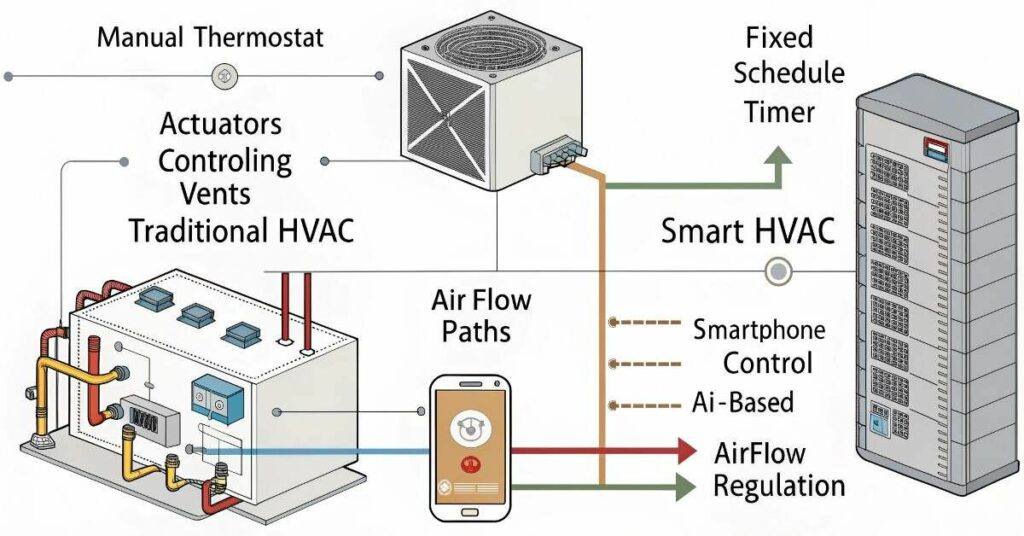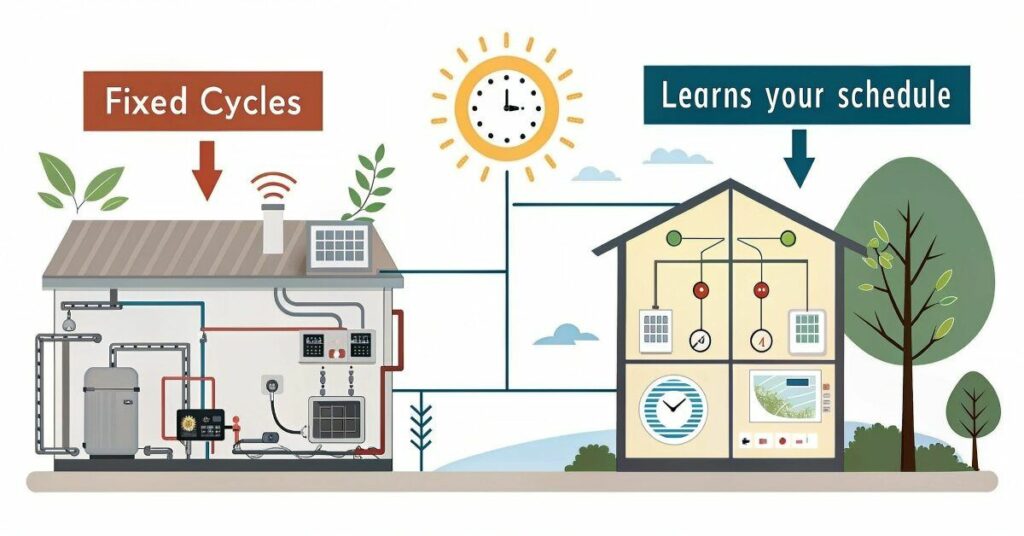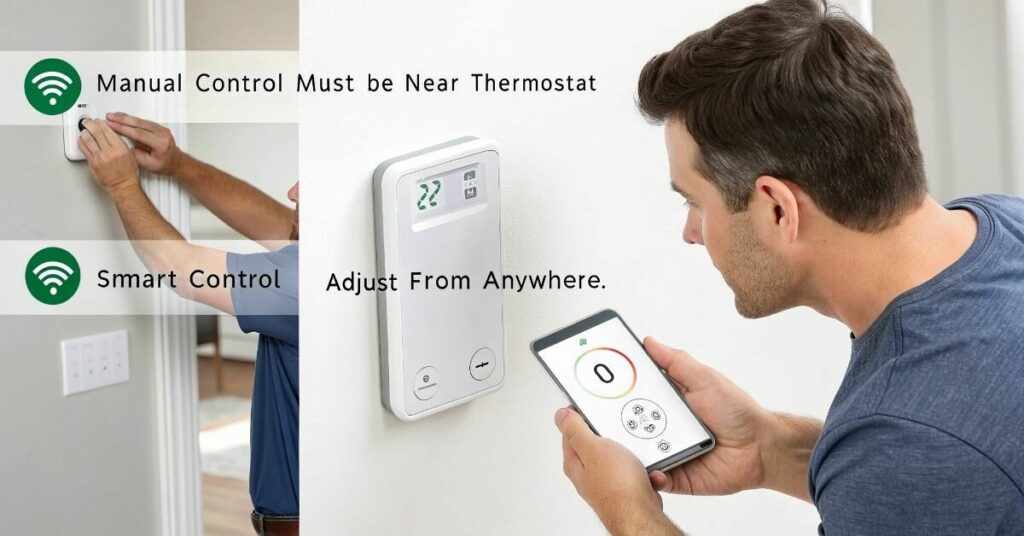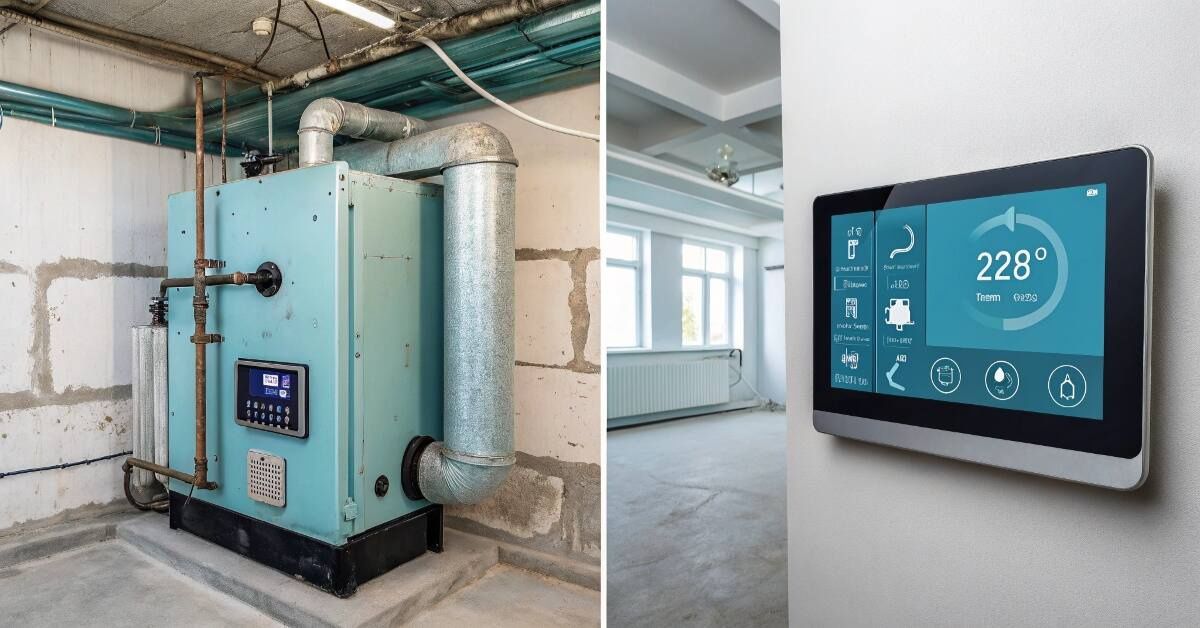Smart HVAC Systems help you use less energy each day. They adjust the temperature in your home according to how you live. You’ll use less energy and spend less money on your bills. Traditional systems don’t use technology, but smart ones do to make processes more efficient.
You can control your HVAC system remotely when it is smart. You can manage your settings from your phone, whether you’re at the office or on holiday. You can always keep your home at the right temperature, no matter when or where you are. The flexibility here is not possible with traditional systems.
You’ll also benefit from real-time comfort and useful details. Smart HVAC systems are always aware of what’s happening in your space. They instantly show how temperature and air quality can be adjusted. It helps you keep your home healthier and more comfortable to live in.
Table of Contents
ToggleHow They Operate

The airflow in traditional HVAC is controlled when actuators open or close the vents. These systems depend on being set manually and following fixed schedules. Once you have set them, they stay the same unless you update them yourself. It often means energy is wasted because rooms are not in use or the weather has changed.
Smart HVAC systems are not like other systems. They rely on technology to discover what you prefer. That way, they can automatically regulate both temperature and airflow. So, you don’t have to work hard to keep your home comfortable. These methods help use less energy and achieve better results.
Energy Efficiency

Learning your schedule, smart HVAC systems help you use less energy. They turn on heating or cooling only when you are at home. You use less power without feeling uncomfortable. As time goes on, they use only the amount of energy needed for the task.
Units carried out in traditional ways usually work more than is necessary. Because they are not adaptive, they work in fixed cycles. In turn, their lives may get so busy that they end up spending more time and money.
Here’s how smart systems improve efficiency:
- Learn user behavior for smarter control
- Adjust the settings for you
- Avoid using heating or cooling when you don’t need to
- Use data from the moment to manage your energy needs
User Control & Accessibility

You can change your home’s temperature from anywhere with a smartphone when you have a smart HVAC system. Making changes to your phone’s settings is simple, whether you’re in the office or on the road. You can always keep yourself comfortable, thanks to this technology.
Alternatively, manual systems must be physically adjusted to function properly. You have to be near the thermostat to change the settings. If you are in a new place and want to refresh your look, it can be hard to make quick changes to your hair. They give users greater flexibility and make things simpler.
Maintenance & Troubleshooting
If something is not working properly with your HVAC system, you’ll receive a quick alert. They use their own systems to find any issues quickly. It allows you to deal with problems early on. Because of this, updating the system is easier and less expensive.
Usually, traditional systems rely on routinely checking and making guesses. Issues are rarely seen until something breaks down. These conditions may cause repairs to last longer and cost you more money.
Here’s a quick look at how they compare:
Feature | Smart HVAC Systems | Traditional HVAC Systems |
Problem Detection | Real-time alerts and diagnostics | Periodic manual inspections |
Maintenance Response | Quick and proactive | Reactive and delayed |
Repair Costs | Lower due to early fixes | Higher due to late issue discovery |
Long-Term Cost Impact
Using a smart HVAC system can help you save money on both your energy bills and repairs as time goes by. They use less energy and can find any problems quickly. As a result, you can expect fewer problems and less wasted energy. In time, these savings get larger and help your budget remain safe.
In the end, traditional systems can be more expensive than modern ones. Because they are not very efficient, they use a lot of energy and often need to be fixed. The latest features in dryers allow them to work longer. Even though they are less expensive in the beginning, the extra costs come up quickly.
FAQ’s
What makes Smart HVAC Systems different from the conventional ones we are used to?
Unlike traditional systems, Smart HVAC Systems use sensors and are automated, improving comfort and cutting energy use.
Can Smart HVAC Systems really reduce my energy bills?
Indeed, they adjust the temperature in your home using real-time information which helps save money on utilities.
What makes Smart HVAC Systems convenient for users?
It’s possible to adjust your lights from any place by using your phone.
Conclusion
Using a smart HVAC system brings several obvious advantages. They save money on energy, let you set the temperature from afar and keep your home comfortable day in and day out. In addition, they are simple to maintain and can help lower future expenses.
Even though traditional systems still function, they frequently use too much energy and require extra maintenance. Anyone looking for easy ways to save will find smart systems to be a wise pick. An upgrade to your home can provide you with a better experience and less stress later.

